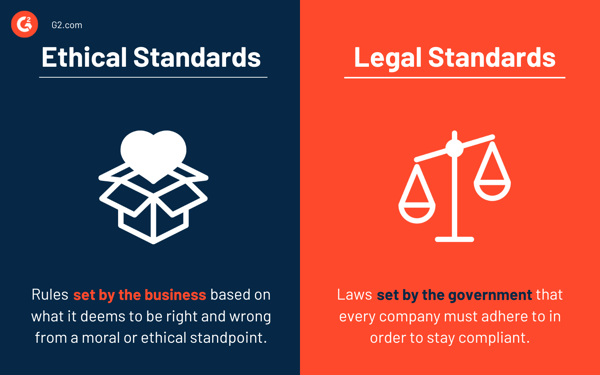November 11, 2022
 by Lauren Pope / November 11, 2022
by Lauren Pope / November 11, 2022

Just because something isn’t illegal doesn’t mean you should do it.
There’s been a sharp change over the last 20 years of corporations taking more firm, public stances about hot-button issues and getting involved with their community. At the same time, we’ve also seen companies in hot water over not technically illegal but still shady business practices.
These two drastically different stories of the path a company can take might not seem like they have a lot in common, but they do. Both are examples of how business ethics and social corporate responsibility can shape the public image, culture, and success of a company's governance, risk management, and compliance (GRC) program.
The question of what is and isn’t ethical is a tricky one to answer. It’s something that’s still being debated in major news publications as well as on every major news network. The key to knowing where to draw the line in regard to business ethics starts with understanding what business ethics are.
Business ethics are the principles a company conducts its behavior with both their employees and the outside world.
Simply put, business ethics are meant to ensure a level of transparency and trust between a business and everyone involved with them. The tricky thing about business ethics is that there is no set standard for how a business should practice them.
Unlike legal standards, which equally apply to everyone in a certain industry, business ethics are usually decided by the company itself. It's common for businesses to use employee engagement software to promote positive ethics amongst teams.
To truly understand business ethics, we need to define how they differ from legal standards.
In the simplest terms, legal standards are the laws set forth by the government that every company must adhere to in order to stay compliant. Regulatory compliance is a universal experience that all businesses deal with.
On the flip side, ethical standards do not have any grounding for legal obligations. These are not laws that businesses are required to follow. Rather, they are based on what we as humans deem right and wrong.

A perfect example of the blurry line between ethical and legal standards comes in the case of Martin Shkreli. The former CEO of Turing Pharmaceuticals came into the national spotlight after it was revealed his company raised the price of the drug Daraprim by 5,000%, increasing the cost for consumers from a mere $13.50 per pill to $750 per pill overnight.
Shkreli was unmoved by the public outcry of such a price hike and defended his decision, claiming that what he did was perfectly legal. And he was right. Shkreli broke no laws when he decided to raise the price of Daraprim. He later doubled down on his decision, saying the only thing he regretted was not raising the price even higher.
But does that make what he did right? This is where business ethics come into play. What responsibility do businesses have to the public? And should a company do whatever it takes to maximize profits (even if it’s legal) if it means consumers suffer for it? These are the questions that need to be considered when discussing business ethics and social corporate responsibility.
A business should keep the following ethics in mind as they strive for ethical behavior.
Each individual within an organization, whether they’re the CEO or an entry-level employee, is expected to show personal responsibility. This can mean completing tasks assigned by their supervisor or just fulfilling the duties within their job description. This also includes owning up to mistakes when they happen.
A business will always have responsibilities to its employees, clients, customers, and sometimes, board members. These can include legal or contractual obligations and even promises to keep. An example would be promising to conduct business fairly and treat employees respectfully.
A business builds trust with customers, clients, and employees by being honest, transparent, and reliable. From an employee standpoint, they should feel they can trust the business to keep up the terms of their employment. And customers should be able to trust a company with their money and potentially sensitive information.
Being a trustworthy business means people want to work with you and for you.
Businesses and their employees should show loyalty. As an employee of an organization, that person should be loyal to their managers, team members, and the company. This can sometimes include speaking positively about the business in public and keeping corporate issues private.
A business should always treat employees, clients, and customers with respect. Similarly, employees should treat their coworkers with respect, too. When this occurs, people feel like a valued part of the team or an important customer. Showing respect also includes caring about opinions, keeping promises, and working hard to solve challenges or issues as they happen.
A fair business applies the same standards and requirements to all its employees. The standards encompass honesty, responsibility, and integrity are the same for entry-level employees and the CEO. Businesses should also treat customers with equal respect by offering the same products and services with the same terms.
With technology at the forefront of most businesses, it’s crucial to consider elements like customer privacy, fair practices surrounding intellectual property, and safeguarding personal information.
There are many ways a business can express the ethics they stand for. Here are some examples of ways a company can put its ethics into practice.
Looking to align legal strategy with ethical business practices? Learn why building a strong in-house corporate counsel team matters.
Now that you understand the similarities and differences between business ethics and social corporate responsibility, it’s time to dig into why you should care.
For more seasoned employees and older generations, the thought of corporations getting involved in charity might seem weird. At the very least, it might not seem like it’s worth the trouble. But there’s some serious data that suggests it’s exactly the sort of thing companies should be doing.
There's no denying that the job market is competitive, and if your business wants to attract top talent during its recruitment process, having ethical behavior is a great place to start.
Make sure recruiters within your HR department tell candidates about the ethical behavior your company stands by as a way to set your business apart from the rest. Doing so will open your business up to a larger talent pool, too.
More companies are doubling down on this idea than ever before. In fact, 92% of Fortune 500 companies published sustainability reports, up from 90% in 2019. This number will likely continue to trend upward as more businesses find value in publicizing their ethics and initiative programs.
Having defined business ethics establishes a code of conduct for employees to follow that will drive positive behavior. When all employees are making ethical decisions, the company will build a reputation for being trustworthy, fair, and customer-centric. As this reputation grows, it's likely the company will build brand recognition, attract investors, and have better customer retention.
Above everything else, supporters of business ethics and social corporate responsibility will tell you the main reason to get involved is because it’s the right thing to do. You’ll win more supporters for your business by giving back to the community than you would conducting shady (but legal) business dealings to make a quick buck.
At the end of the day, people want to work with a company they trust.
Once you've narrowed down the ethics your business stands for, learn how to incorporate them into a strong company culture.
This article was originally published in 2019. It has been updated with new information.
Lauren Pope is a former content marketer at G2. You can find her work featured on CNBC, Yahoo! Finance, the G2 Learning Hub, and other sites. In her free time, Lauren enjoys watching true crime shows and singing karaoke. (she/her/hers)
Money isn’t everything, but it is a significant factor for just about anything you can imagine...
 by Kayleigh Alexandra
by Kayleigh Alexandra
Recruiting top talent is crucial to the success of any organization.
 by Mara Calvello
by Mara Calvello
Maternity and paternity leave policies in the United States leave something to be desired.
 by Kylie McQuarrie
by Kylie McQuarrie
Money isn’t everything, but it is a significant factor for just about anything you can imagine...
 by Kayleigh Alexandra
by Kayleigh Alexandra
Recruiting top talent is crucial to the success of any organization.
 by Mara Calvello
by Mara Calvello

